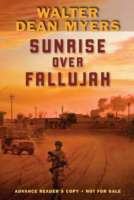
Robin Perry, from Harlem, is sent to Iraq in 2003 as a member of the Civilian Affairs Battalion at the beginning of Operation Iraqui Freedom, and he will be the liaison between the military and the Iraqis. His time there profoundly changes him.
Related: Iraq, Middle East, Realistic Fiction, Young Adult (ages 14-18)
- ISBN: 9780439916240
- Author: Myers, Walter Dean
- Published: 2008, Scholastic Press
- Themes: African Americans, military, Soldiers, Survival, War
- Descriptors: Iraq, Middle East, Realistic Fiction, Young Adult (ages 14-18)
- No. of pages: 304

Sunrise is related to Fallen Angels about the Vietnam War because the main
character in Sunrise writes to his uncle who was the protagonist in Angels.
That book was often challenged because of what some thought was inappropriate
language, soldiers used profanity. I am concerned about the truthfulness of
the language in Sunrise. The language of the soldiers is very different from
the language of the soldiers in Angels. I asked two colleagues and a recent
Iraq veteran to read it. Each of them felt that Sunrise is an important novel
for this time. Although the vet thought its content was accurate, all of us
felt that the language appears sanitized and makes the book lack authenticity.
I am wondering that in this time of censorship over the smallest offensive
detail, Myers may have made a decision to moderate the language to avoid having the book become a target for censorship. So I contacted him through e-mail and received this reply:
Forwarded Message:
Subj: Re: A question about Sunrise over Fallujah
Date: 3/4/2008 3:52:38 AM. Pacific Standard Time
From: myers125@ix.netcom.com
To: MarilynCaz©aol.com
Dear Marilyn Carpenter,
I discussed this issue at length with my son, a career Air Force officer and his
wife, a major currently serving as a trauma counselor, also in the Air Force as
well as other military personnel. These are their opinions and the opinions
which helped me shape the book.
1 . Although there is much more profanity in the daily speech among soldiers
than there would be among civilians, it is not as prevalent as it was during
the Vietnam era because of differences between how officers and enlisted men
interacted and how men below the officer rank interacted. Complaints of verbal
abuse were unheard of during Vietnam but are more common today.
2. There is far less profanity in technical units than there is in combat units
and far less in service units (Finance, Medical, Legal, etc). In a unit
primarily dealing with Civil Affairs you would find less profanity.
3. Today?s Army looks upon itself more as highly technical units operating
under rather fluid conditions wherein yesterday?s Army dealt more with
individual and unit toughness and the need for bravado (which is what profanity
is about) is not necessary.
4. Finally, the deliberate introduction of profanity into military life (and it
was deliberate) was used to desensitize soldiers to the killing. One killed
?motherfuckers? and ?gooks? and ?slants,? not husbands, fathers and
sons. I think in fiction we also experience this desensitizing and separation.
Reviewers who applauded ?Fallen Angels? never seemed to consider the
Vietnamese who were being killed, only the Americans.
My feeling was that the officers with whom I spoke and corresponded thought the
language had changed significantly and I went along with their feelings. One
Infantry Captain was bothered by a passage in the book in which an officer
spoke in a disrespectful manner to his squad.
I also intentionally left out the racial aspects in which the Americans refer to
the Iraqis as “hajjis,” “sandniggers.” “handkerchief heads” and “La-La boys” (referring to Allah). Again, referring to the enemy as other than human beings separates the acts of killing from the humanity with which I want to infuse my book.
What I wanted to do with this book was to address the issue of war in the Middle
East and what it means to young people. I wanted to counter some of the
mythology that grows around the reporting of any war and especially I wanted to
take away the glamour with which wars are depicted in films and television, the
most accessible accounts offered to young people. I wanted to depict the Iraqis
as human beings, not just a faceless and abstract “enemy” and I wanted to
talk about humans killing and being killed. A Vietnam vet once wrote me a
letter saying that he “was sorry your brother got nailed, hope he got a bunch
of the fuckers before they got him.” In my mind it was demeaning to my brother
to say he was “nailed” instead of killed and demeaning to what he was doing
in Nam to call the enemy fuckers. But it’s easier for some people to deal
with.
Finally, I would like to question what is “authentic” speech. Is it “authentic” to mimic the speech of an inner city teenager who uses a great deal of slang as well as profanity, or are we merely coating him with one small aspect of who he is in a way that masks the whole person?
A long answer, but one I mulled over for the weeks and months that I worked on
the book. Thanks for your interest. Walter Dean Myers
I thought it was valuable to see Myers’ thinking and his care over the topic.
What do you think?
Marilyn Carpenter